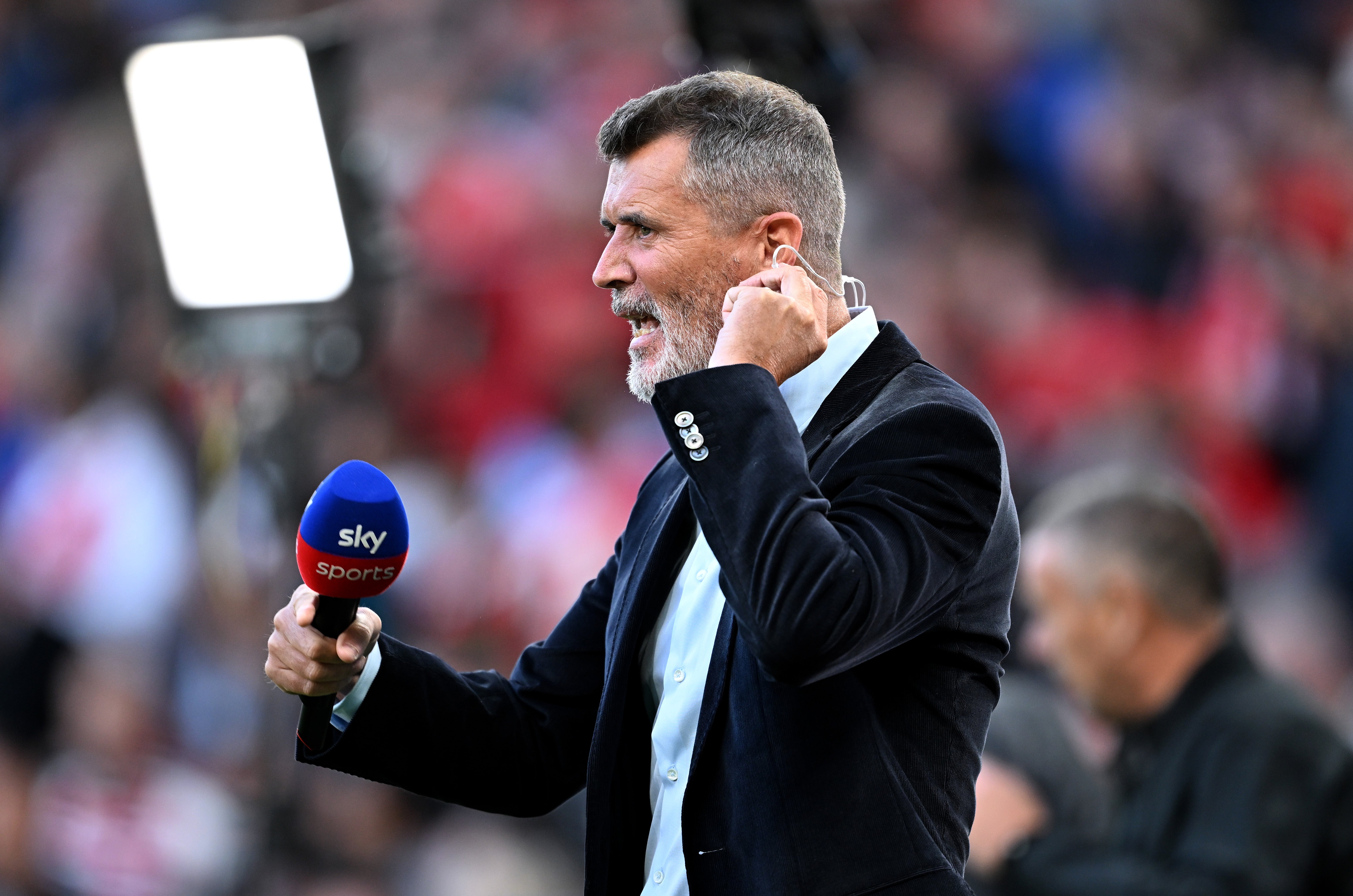You may have seen the clip of Roy Keane exchanging views with an Ipswich fan on Sunday. Keane hears his heckler from Sky Sports’ pitchside station, slips his hands into his coat pockets (he can make the innocuous somehow seem menacing), and strides over for a robust conversation.
Keane can be heard inviting the fan to meet him later in the car park, universally understood pub parlance, though he deftly adds “we’ll discuss it” to leave room for interpretation over whether he is arranging a fight or a scheduled Zoom meeting. Security step in and the moment passes. Jamie Redknapp arrives decidedly late with a “just leave it”, well after it has already been left by all parties. Perhaps the fan got away from the ground early to beat the traffic, because the promised car-park meeting never materialised.
All of which would be much ado about nothing if similar incidents didn’t happen on a regular basis. Last year an Arsenal fan was found guilty of headbutting Keane at the Emirates Stadium. Keane has been filmed clashing with supporters of different stripes at various grounds, and the incident at Ipswich was hardly a surprise given his tumultuous time as manager at Portman Road. In retrospect it was perhaps a foolish move to put him in that position so close to supporters.
And while it could be said that Keane doesn’t help himself, sucking football idiots towards him like moths to a flame that he himself has lit, he is far from alone in being harassed. Gary Neville is regularly abused and has had drinks thrown over him outside the Etihad Stadium, while every woman pundit is castigated on social media when they dare utter words on the men’s game. Abuse comes with the territory, it seems, but Keane appears genuinely fed up, to the extent that he has threatened to walk away.

Asked if he’ll be a pundit in 10 years’ time, Keane said recently: “I’ll struggle for the next 10 months doing this. I love football, but the hassle of matches, getting to games, and the hassle of fans… I was in court a few months ago with somebody headbutting me. Do you think I enjoy that side of it? Absolutely not. The games are fine [but] getting to the games, parking up, people shouting your name, good stuff, bad stuff, it’s a nuisance. Being a pundit in 10 years? No.”
A few years ago his exit would not have been much of a loss to television. Keane was largely used as a rent-a-rant mouthpiece, wheeled on for a carefully choreographed 45-second rebuke of something or someone, usually Manchester United’s “disgraceful” players, which could be clipped up and shared around the world before kick-off (often of a game that didn’t involve Manchester United). Genuine insight was hard to come by; instead it was cynical social media strategy, and it worked.
It spoke to part of Keane’s on-screen allure, that at any given moment he might lean across Jimmy Floyd Hasselbaink and clock Neville on the jaw. We know he won’t, of course. But could he? He wouldn’t actually do it live on TV, clearly, but he also seems to be strangling the arm of his chair with his hand. So, might he?
And yet while he has retained that edge of imminent eruption, a softer and altogether more avuncular Keane has emerged in recent times. A juxtaposition with the guffawing Micah Richards began to open up Keane as a more nuanced TV character and, crucially, someone who could laugh at himself. Now his role on The Overlap’s relaxed format has thrown open this lighter side of Keane, revealing one of the great anecdotalists of our time.
His stories of often drunken escapades during his football days are always dryly delivered with impeccable comic timing. The tale of how, in his early days as a player at Manchester United, he was thrown through a glass door of a wine bar is a fine example; likewise his response when asked by Neville whether he had ever apologised to anyone during his career: “I don’t think I ever did anything wrong,” Keane deadpanned with a flicker of a grin, to much laughter.
It was the same wicked grin in a recent episode when Jill Scott mentioned playing against former West Ham striker Marlon Harewood, who “smashed” through her women’s team. Keane couldn’t resist asking: “And how was the game?”
While the Express described Keane as “coming under criticism” for the lewd joke, it turned out that the source of the criticism was actually just a tweet by Piers Morgan daring “the joyless over-sensitive snowflake woke brigade” to be offended, despite absolutely no one taking offence outside of Morgan’s mind. Keane has a universal quality that cannot be weaponised by the culture war, however hard some might try.
Clips on YouTube or social media tend to be filled with comments to the effect of “I hated and continue to hate Man Utd but you can’t not love Roy Keane”, thus completing one of the more unlikely transformations from football hard man to fantasy dinner guest. Like many great comics he even has a catchphrase, dropping “that’s his job” whenever the moment requires.
Perhaps it points to a reality of sport, that we never truly know an athlete until they’re finished, until the competitive juices are wrung out. Keane has become comfortingly grumpy in middle age, an analogue man in a digital world who doesn’t take himself too seriously, not stuck enough to be a football dinosaur but with a proper football man’s healthy scepticism for expected goals.
In doing so he has become something of a treasure, and if Keane really is reaching the end of his tether then football fans may soon lose one of the few green shoots among the general mulch of modern football discourse. Sky Sports and the wider football community must protect him at all costs.

